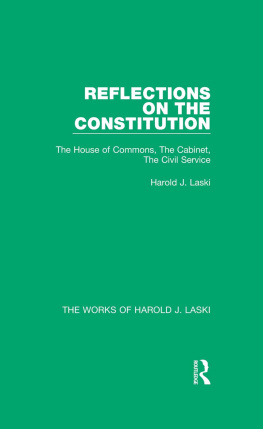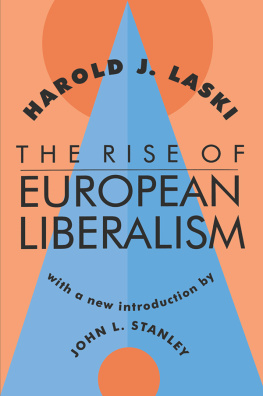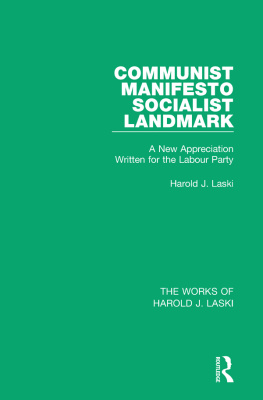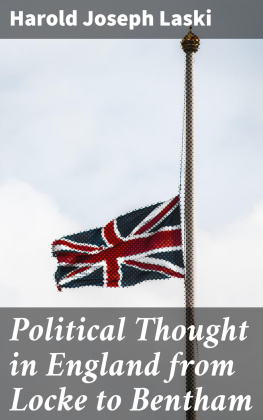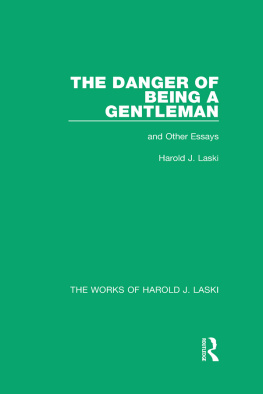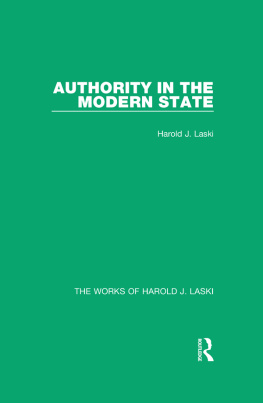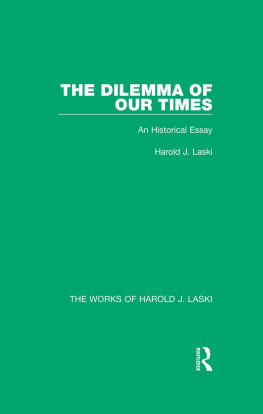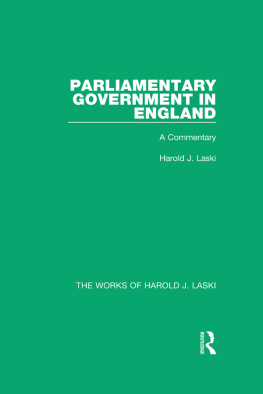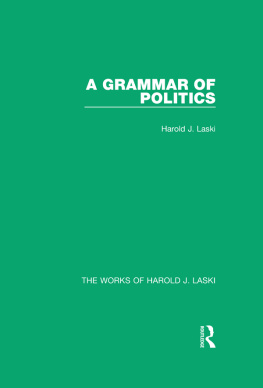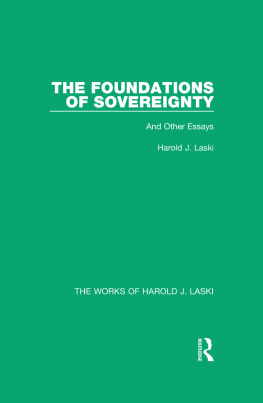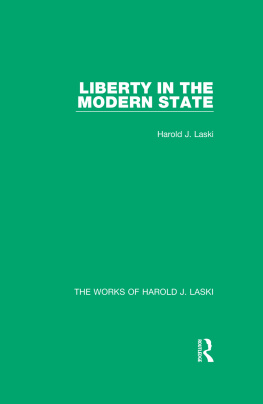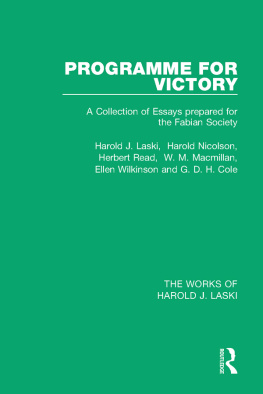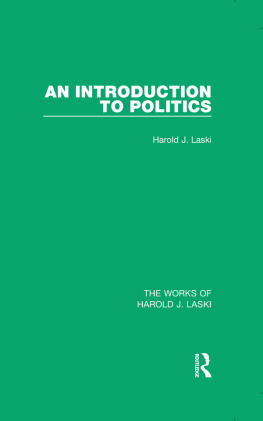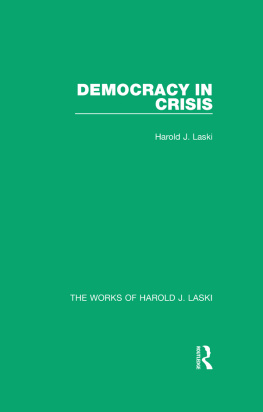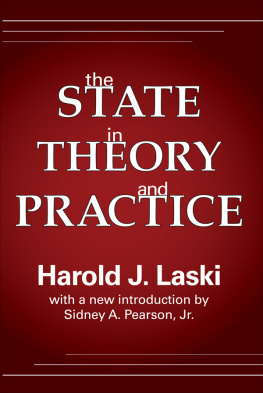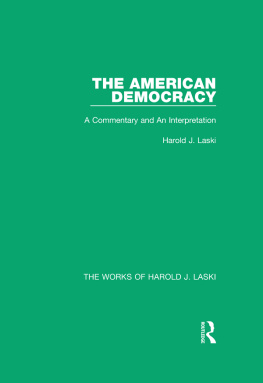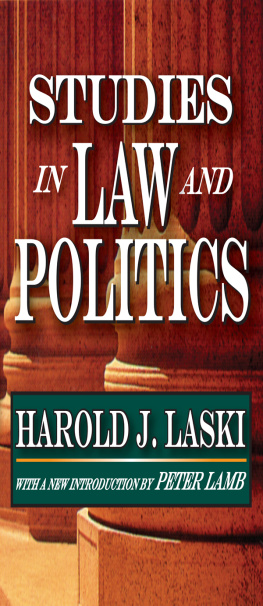THE WORKS OF HAROLD J. LASKI
Volume 17
REFLECTIONS ON THE CONSTITUTION
REFLECTIONS ON THE CONSTITUTION
The House of Commons, The Cabinet, The Civil Service
HAROLD J. LASKI
First published in 1951
This edition first published in 2015
by Routledge
2 Park Square, Milton Park, Abingdon, Oxon, OX14 4RN
and by Routledge
711 Third Avenue, New York, NY 10017
Routledge is an imprint of the Taylor & Francis Group, an informa business
1951 Manchester University Press
All rights reserved. No part of this book may be reprinted or reproduced or utilised in any form or by any electronic, mechanical, or other means, now known or hereafter invented, including photocopying and recording, or in any information storage or retrieval system, without permission in writing from the publishers.
Trademark notice: Product or corporate names may be trademarks or registered trademarks, and are used only for identification and explanation without intent to infringe.
British Library Cataloguing in Publication Data
A catalogue record for this book is available from the British Library
ISBN: 978-1-138-81912-2 (Set)
eISBN: 978-1-315-74273-1 (Set)
ISBN: 978-1-138-82247-4 (Volume 17)
eISBN: 978-1-315-74253-3 (Volume 17)
Publishers Note
The publisher has gone to great lengths to ensure the quality of this reprint but points out that some imperfections in the original copies may be apparent.
Disclaimer
The publisher has made every effort to trace copyright holders and would welcome correspondence from those they have been unable to trace.
REFLECTIONS
ON THE
CONSTITUTION
THE HOUSE OF COMMONS, THE CABINET THE CIVIL SERVICE
by
HAROLD J. LASKI
Published by the University of Manchester
at the University Press
8-10, Wright Street
Manchester, 15
1951
Printed and Bound in England by
C. Tinling & Co. Ltd., Liverpool, London and Prescot
The late Professor Laski was invited to deliver three public lectures in the University of Manchester in February, 1950. He gave these lectures to large audiences in the week beginning 6th February: for the next fortnight he was actively engaged in the General Election, which was decided on 23rd February; and on 25th March he died. The text of the lectures as it stands is stamped with his personality, and even with the accent and manner of his delivery, but it lacks his final revision. It is impossible to guess what changes he would have made: some corrections have been necessary before publication, but these have been limited to minor points of fact and grammar, and to the insertion of section headings.
CONTENTS
I T is an exceptional pleasure to me to have been invited to give these lectures in the University of Manchester. It is not merely that I am myself Manchester born and Manchester bred. I owe much to the inspiration I received from men whose names are household words in this universityfrom Samuel Alexander, from T. F. Tout, and from Michael Sadler among its teachers, from C. P. Scott among the citizens of Manchester, who, in my youth, thought the status of this University a matter of immense importance to the quality of its civic life, and to my friend, Lord Simon of Wythenshawe, who, with Lady Simon, has, if I may say so, given to this city a continuity of devoted service not less important than the generosity he has shown it. I come to the University of Manchester from an institution which, if younger than yours, has had the good fortune to have its traditions established and given shape by one who thought, as the men who developed the University of Manchester thought, that the first task of learning and scholarship is not research for its own sake, but the achievement of a profounder knowledge of mens relation to nature. They were, I think rightly, convinced that there was no other way in which to discover the questions we should ask in the hope of transforming Man from a rebel against a harsh and unfriendly universe into a master of its forces, and thus into that self-mastery that is one of the essential conditions of a free society.
Our age is one of turbulence and confusion, in which the large-scale breakdown of traditional values has made many doubt the validity even of the institutions which lie at the basis of our national life. I propose, therefore, in these lectures, to re-examine two great institutions, confidence in which is the obvious clue to the maintenance of a democratic society. I propose to examine the present condition of the House of Commons, and that of the Cabinet, and, in part, of the Civil Service upon the efficiency and imaginative capacity of which so much of the adequacy of Parliamentary Government depends. I do not need to tell you that, especially in the last thirty years, there has been a growing suspicion, both on the Right and on the Left, about their adequacy in relation to the immense problems we have to solve. Severe judgments have been passed upon the effectiveness of the House of Commons not only by those who have observed it merely from without, but, hardly less, by many who have known it intimately from within. We have been asked to regard it as nothing but an organ of registration for the Cabinet, a body of miscellaneous amateurs, whose discussions do not count, whose criticism and investigations go unheeded, whose independence has been so impaired by the rigidity of party discipline that it has lost the high status it once enjoyed when the whole nation watched with passionate interest the epic contests in which men like Gladstone and Disraeli crossed swords in debate. We have been told that it has delegated so much of its power to Ministers and the officials of their Departments that it can no longer protect the freedom of citizens nor safeguard their property from the inexhaustible rapacity of a ruthless bureaucracy. We are urged to regard it as in need of reforms so massive that when it emerged from their acceptance it would no longer be recognisable as the classic institution to which so many admiring tributes were wont to be paid. Nor, indeed, has the Cabinet been spared by the critics. Its influence has diminished, in the first place, as the power of the Prime Minister has grown. Perhaps no more than a quarter of its members are really influential; they constitute an inner oligarchy which has reduced the rest to a body of pale ghosts who are only less surprised at the formal eminence for which they have been selected than are their friends at the fact of their choice. In any case, it has been urged, the work of most Government Departments is now so massive and so exacting, that only a Minister, not only of exceptional power, but, also, of outstanding character, can really operate his own office in terms of a policy that is his own; the real truth is that most of them are, in the hands of their officials, little more than puppets who dance on wires the movement of which is controlled by a small number of civil servants who have exchanged the trappings of formal dignity for the reality of effective power. It is, moreover, rare in these days for a Minister to know his Department well enough when he arrives there for the first time genuinely to be able to take charge of its activities. The alternative to trusting his officials to show him the way is to make mistakes of such proportions as to make him an obvious liability to the Government whom the Prime Minister will quickly change for someone who achieves the reputation of being an asset. But to be an asset, the critics insist, either the Minister must be seen and not heard or he must place himself in the hands of his officials who will guide him to some small achievement and prevent him from making mistakes. The remarkable politician apart, a dutiful obedience to the administrative heads of his Department is much the most direct road to the reputation of a sound and knowledgeable man.

